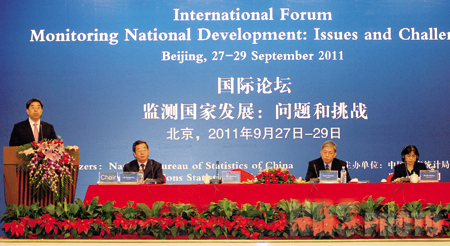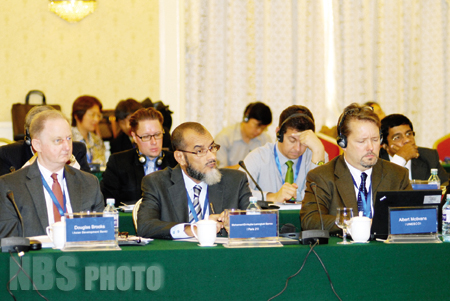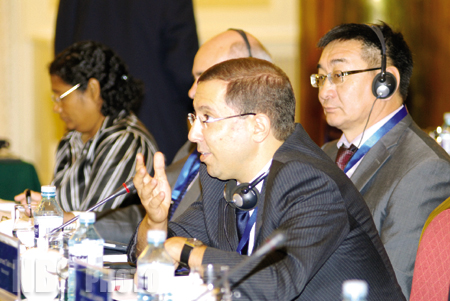International Forum on Monitoring National Development Held in Beijing
International Forum on Monitoring National Development: Issues and Challenges were jointly organized by United Nations Statistics Division (UNSD), World Bank (WB) and National Bureau of Statistics of China (NBS), on September 27-29, in

The Forum focused on how to better monitoring economic growth, structural change, and social development, discussing the possibilities on green economy and green growth, formulating action plan on statistics servicing national development. The Forum aroused widespread attention in domestic and abroad, 88 representatives from 9 international organizations, such as UNSD, WB, UNESCO, ILO, OECD, ADB, Eurostat, and 37 countries and regions, such as United Kingdom, Germany, Australia, Russia, India, Brazil, Japan, Korea, Thailand, Mexico, Mozambique, and from NBS, MOFCOM, Census and Statistical Development of HK SAR, Renmin University of China (RUC), and Central University of Finance and Economics (CUFE), attended the Forum. The Forum focused three themes on the exchange of "Statistics and National Development", "Monitoring the Development of Education" and "Monitoring Employment", carried through case study and expert discussion on "Monitoring Economic Development", "Monitoring Social and Environmental Development", and "Training and Capacity Development". The Forum put forward statistical frameworks on tracking economic, social and environmental development, programme work for capacity development, and brought forward a plan of action on statistical development.
Mr. Ma Jiantang pointed out that the monitoring and servicing national development, has become the common mission and important duty to the national statistical offices. Governmental statistics served as an important information system for national development, and tool for governing the country, which has the responsibility to reflect the basic conditions and developments in different fields, such as: population, economy, society, science and technology, education, culture, environment and so on, and provided higher quality, more timely, and a larger volume of information for the national development. Standing at a new historical starting point, the Chinese governmental statistics will further improve the statistical survey system to reflects the country's development, and statistical monitoring system, enhance the statistical capacity, speed up the modern information technology applications in statistical work, and strive to provide better statistical services for the national development.
Mr. Paul Cheung said in the address that monitoring the economy, society and environment is an important part of official statistics, which has the significant meaning in promoting sustainable development of the world economy. The current world economy was transferring to the green economy from industrial economy, the official statistics should actively responding to this important change, strengthening statistical monitoring, constructing new framework, adopting new indicators of social development, focusing on the UN Millennium Development Goals for future development, concerning the development of the labor, social welfare and environment, foucusing on the economic and social structural changes, expanding new areas of statistics, and continuously improving statistical capacity.
Mr. Shaida Badiee said in the address that the rapid development of world economy raised new demands to the official statistics, the national official statistics of countries should discovering new statistical requirements, strengthening partnerships at national and international levels, strengthening ICP works, strengthening the monitoring the social, environmental accounting of UN Millennium Development Goals, and continuously improving the quality of official statistics, and to better meet the needs of the new statistics.
Mr. Justin Yifu Lin said via video link that, the world economy is facing employment, poverty, and many other challenges. In order to help countries to get out of financial crisis as soon as possible, it should be putting efforts to expand employment in short-term, promoting the UN Millennium Development Goals in the medium to long term, achieving sustainable shared economic growth. In this process, the official statistics was playing an increasingly important role. The official statistics should as much as possible to providing statistical data in economic, social, and environmental aspects, in particular, providing detailed data on industrial activities to help economists for better analysis, and to help government for better decision-making.

The Heads from the national statistical offices of the countries and international organizations, and relevant experts conducted in-depth discussion around the theme of the Forum.
In the country case study on monitoring economic development, Qatar Statistics Authority (QSA), Direction de
In the discussion on statistical challenges in economic statistics, Lao Statistics Bureau (LSB), Russian Federal State Statistics Service (ROSSTAT), Statistical Research and Training Institute, Ministry of Internal Affairs and Communications of Japan, presented their specific challenges facing countries in their economic statistics programmes, respectively.
In the discussion on measuring economic growth and structural change, statistical experts and representatives from Department of Statistics of
In the topics on monitoring education development and employment, the UNESCO Institute for Statistics, and ILO presented a programme of education statistics needed to inform on education status and policies and the national and international levels. In the country case study on monitoring social development, Ghana Statistical Service (STATSGHANA), Badan Pusat Statistik (BPS-Statistics Indonesia), Instituto Nacional de Estadística, Geografía e Informática (INEGI), National Statistic Bureau of Bhutan, presented the statistical programmes in place in their countries to monitor social development issues and their plans and priorities for further development of their social statistics programmes, respectively.
In the discussion on monitoring the environment, Statistics Korea (KOSTAT), Statistics South Africa (STATS SA), Bangladesh Bureau of Statistics (BBS), discussed country experiences in the datasets that may be needed in measuring green economy and green growth initiatives currently being pursed, respectively. For monitoring social and environmental development framework, NBS, CSO, Development Economics Data Group of the WB, discussed on the requirements from programmes of statistics to inform on education, labour and other human capital and social developments and environmental issues, respectively.
For statistical capacity development, NBS, BPS-Statistics Indonesia, KOSTAT, and Statistical Research and Training Institute, Ministry of Internal Affairs and Communications of Japan, presented their experience in statistical training, respectively, STATS SA, MONEOMAN, National Statistical Coordination Board of Philippine (NSCB), and Eurostat, presented the programme for training and capacity development in economic, social, and environmental statistics, respectively.
For the Plan of Action on Statistical Development highlighting the important areas of statistics on which the development community should focus in the next 10 years, WB, UK aid from the Department for International Development (DFID), Eurostat, African Development Bank, and Ghana Statistical Service, comprised an initial consideration and endorsement of a Plan of Action on Statistical Development highlighting the important areas of statistics on which the development community should focus in the medium term, this Plan will be submitted to the Ministerial Aid-Effectiveness Conference to be held in late November

The Director-Generals from Administrative Office, Department of International Cooperation, Department of Policies and Legislation, Department of Comprehensive Statistics, Department of Statistical Design and Management, Department of National Accounts, Department of Personnel, Department of Finance, Statistical Dissemination Center, Statistical Education and Training Center, Research Institute of Statistical Sciences, participated the Forum.
